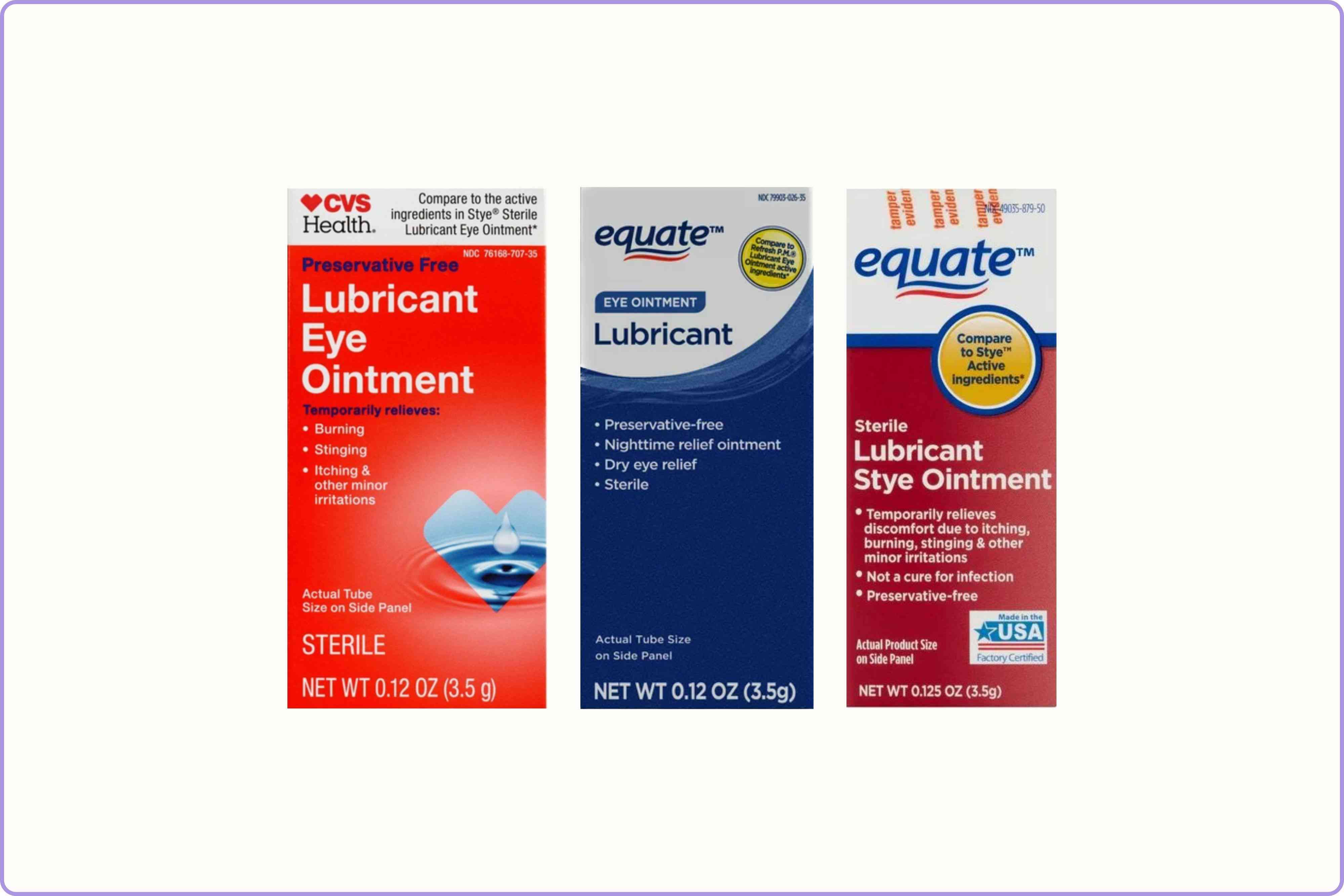Recall Alert: Eye Ointments Sold at Walmart, CVS May Pose Infection Risk Here's what to know

Four eye ointments made by Brassica Pharma and sold by Walmart and CVS have been recalled over concerns of possible eye infection risk
- Four eye ointments have been recalled over concerns of possible eye infections, the FDA shared Monday.
- The eye ointments, manufactured by Brassica Pharma, include products sold at Walmart and CVS.
- The voluntary recall was issued after an FDA inspection identified sterility concerns at the manufacturing facility; no injuries or adverse reactions have been reported.
Four eye ointment products have been recalled due to a potential risk of eye infections, the Food and Drug Administration (FDA) shared Monday.
The recalled eye ointments, manufactured by Brassica Pharma, include two products sold under Walmart’s brand, Equate, as well as products from CVS Health and AACE Pharmaceuticals. The voluntary recall was issued after an FDA inspection identified sterility concerns at the facility where the products were made.
No related injuries or adverse reactions to the eye ointments have been reported, Brassica Pharma said in the company news release. Instead, the products are being recalled out of an abundance of caution—particularly due to a heightened risk of harm to users, “drugs applied to the eyes bypass some of the body’s natural defenses.”
The four recalled products have expiration dates ranging from February 2024 to September 2025. See below for the eye ointments affected by the recall; for specific lot numbers and expiration dates, see the company’s announcement.
- Equate Lubricant Eye Ointment: UPC Code 681131395298
- Equate Stye Lubricant Eye Ointment: UPC Code 681131395304
- CVS Health Lubricant Eye Ointment: UPC Code 050428634141
- AACE Pharmaceuticals Lubricant PM Ointment: UPC Code 371406124356

CVS Health / Walmart
The newest recall comes months after a large eye drop recall that began in October 2023. As of February 2024, a total of 28 eye drop products sold by stores including CVS, Rite Aid, and Walmart have been pulled from shelves due to the risk of eye infections that could cause partial vision loss or blindness. No injuries or adverse events linked to the 28 recalled eye drops were reported at the time of the announcement.
Separately, the Centers for Disease Control (CDC) and FDA alerted the public in February 2023 to stop using EzriCare or Delsam Pharma’s Artificial Tears products after the products were linked to a drug-resistant strain of Pseudomonas aeruginosa. At least 81 patients across 18 states were identified as having infections. Of those patients, 14 patients suffered vision loss, four patients needed the affected eyeball surgically removed, and four patients died.
The seriousness of that recall is likely fueling newer recalls out of an abundance of caution, according to experts. The sensitivity of the eye area and the heightened risk of harm associated with eye products also have healthcare providers concerned about possible contamination.
“Our eyes are really sensitive organs,” said Michelle Holmes, OD, an optometrist at Pacific Neuroscience Institute in Santa Monica, California. “Any harmful bacteria, virus, or fungus that ends up in our eyes can cause any range of problems, from conjunctivitis (pink eye) or something more serious that can be vision-threatening.”
Eye Infection Symptoms and How to Stay Safe
In the company’s news release, Brassica Pharma said it has notified distributors and retailers about the recalled products, and urged them to remove the product from shelves.
Consumers have also been warned to stop using any of the recalled eye ointments. Any affected products should be discarded or can be returned at the place of purchase.
Additionally, the company said consumers should contact their doctor or other healthcare provider if they’ve experienced any symptoms possibly related to using any of the affected eye ointments.
According to Holmes, those symptoms of an eye infection can include:
- Redness
- Any kind of discharge (goopy, mucousy, clear, or yellowish)
- Pain or discomfort
- Feeling that there’s something in your eyes
- Itching
- Burning
- Sensitivity to light
- Swelling of the eyelid or eye
- Blurry vision
“If you have any symptoms of a possible eye infection, reach out to an eye care provider,” said Holmes. “Let them know your concern. They should be able to provide guidance and evaluate your eyes.”
To further protect yourself when purchasing eye products in the future, it’s wise to check the FDA’s recall lists before, just to be safe, said Mina Massaro-Giordano, MD, co-director of the Penn Dry Eye & Ocular Surface Center and a professor of clinical ophthalmology at the University of Pennsylvania.
Additionally, Holmes recommended avoiding any drops or lubricants that smell off, have particles inside, aren’t sealed, or are past their expiration date.
“I also recommend that you purchase eye drops and lubricants from big brand names,” added Holmes. “Larger companies are more likely to be in compliance than off-brand or discount [products].”
FDA Warning: 27 Eye Drop Products Could Cause Eye InfectionsThis story originally appeared on: Health News - Author:Korin Miller


















